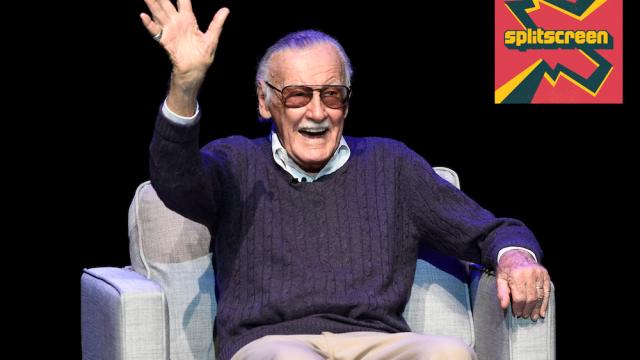What does Stan Lee mean to hardcore comics fans? To answer that question, we brought old friend Evan Narcisse back for this week’s episode of Kotaku Splitscreen.
First, Kirk and I talk about the games we’re playing, like Tetris Effect and Hitman 2, then jump into the news of the week (21:36) on Detective Pikachu, Final Fantasy XV’s canceled DLC, and Destiny 2‘s “disappointing” sales. Then old friend Evan Narcisse joins the show (40:56) to talk about Stan Lee’s legacy and what he meant to nerds all across the world.
Finally, some off-topic talk (59:53) on House of Cards season 6 and Bohemian Rhapsody.
Listen here:
Get the MP3 right here, or read an excerpt:
Evan: It’s funny, Stan Lee has been in my head in some form or fashion for most of my life. As a kid, you pick up a Marvel comic and on the first page is ‘Stan Lee presents.’
As I got older, I heard his voice. You know, there was that old cartoon show, Spider-Man and his Amazing Friends, and Stan Lee narrated every episode. ‘Hey, true believers.’ He’d talk over the transitions between scenes, and he’d basically guide you through the story.
Then, obviously, as an adult, he starts showing up on screen for all these Marvel movies. He’s been around forever. And it feels, oddly, like someone who’s been a constant presence in your life is now gone. He’s not quite family, but like, a friendly old dude who you used to chat up a couple time as month is suddenly not there anymore. It hit me a lot harder than I was expecting. He’s been in poor health these last couple of years—he was in his mid-90s, so it wasn’t hard to imagine that he might go soon. But I wasn’t as ready as I thought I was.
In a more condensed way, he co-created my favourite superhero character, Black Panther, he’s a Stan Lee-Jack Kirby creation.
Kirk: I think a lot of people are hit by the loss of Stan Lee in part because he did such a good job of branding himself, if that makes sense. You were talking about how he inserted himself into comics—you would always read stuff from him at the beginning of comics. I didn’t grow up reading comics nearly to the extent that you did, but I definitely grew up aware of him.
I remember when he turns up in Mallrats thinking, ‘Oh, that’s the guy,’ and he has that great cameo where he gives a sort of life lesson to the character there. And then of course so many people know him because of his cameos in Marvel movies. Can you talk about that a little bit, how he built – he was almost a Marvel character himself.
Evan: Yeah, and one of the things that’s been cropping up in these remembrances and assessments of his career and legacy is, yeah, he built ‘Stan Lee’ as a character. His birth name was Stanley Lieber, and he assumed the pen name Stan Lee because he wanted to keep his real name for that great American novel he was writing, or the play or whatever—he had grander aspirations than comics.
But it turned out the greatest and most impressive thing he did was basically save Marvel Comics from the brink of failure. And he did that by branding himself as a creative, and doing the same for the people he worked with. You open up a Marvel comic from the early 60s and all the contributors had nicknames: Smilin’ Stan Lee, Jolly Jack Kirby…
It made those people feel mythic, like the characters they were creating. I think Stan extended that to a really kind of ridiculous degree when you think about it, but he was larger than life. One of the things I’ve been thinking about and talking about these last couple of days is that he changed what it meant for people to think about people creating – creators being stars.
You had superstar film directors like John Ford, people with name recognition, auteurs in other art forms where you could name-check them and be like, ‘Oh OK this person is a high-level creator in this field.’ Comics didn’t have that before Stan Lee.
Hundreds of people made comics before Stan Lee. Comics have been around in some form or fashion since the late 1930s. But nobody knew who those people were until Stan Lee. The complicated part about Stan Lee is that he talked more about himself than his co-creators, and I think that gave a distorted view of what he’s responsible for, and who created what when we think about the actual architects of the Marvel universe and the comics.
It’s hard to parse because Stan made it seem like he did probably a lot more than he did. But he probably did more than some of his detractors would say. So the truth is somewhere in the middle, as the cliche goes.

Comments